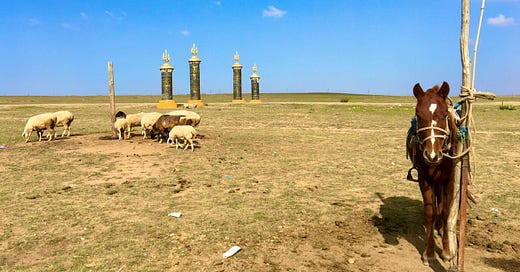Numb in China, finale: 天朝
Celestial empire, dungeon of time, temple to the god of death
At the start of this series, I asked a question, which was ‘What is China?’ After two months in this country, I think I have an answer. It’s not a pleasant answer, and it’s also very long. But this is that answer.
Today I’m writing from the grasslands of Inner Mongolia. For the first time since I arrived in this country, I’m outside the intense China enclosed by the Great Wall, and in the lands of the Man and Yi, the northern barbarians who wear their hair loose and button their clothes to the left, like animals. Today, these places form a thick ring of autonomous regions around China’s more fertile provinces. Inner Mongolia, Xinjiang, Tibet. I’m here to see the steppe, or what’s left of it.
The steppe, it turns out, is a strangely mild place. There are no high mountains or craggy canyons here, nothing particularly majestic or sublime. Just mile after mile of green, gentle fields where nice sheep nibble at the abundant grass. The womb of the Mongol Empire looks a lot like that hill from the Windows XP background, or Teletubby-land. I thought that just walking around in this place would stir something in me: some deep buried urge, latent in the Y-DNA, to conquer the world, put cities to the sword, build pyramids of skulls. But it didn’t come. All I got was a vague sense of guilty affection for the nice sheep, and then the slight nausea when I remembered just how far this gentle countryside sprawls, just how far inland I had come, and what a lonely ocean of earth separated me from everyone I’ve ever known and loved. Inner Mongolia. What a place to end up. The problem was, of course, that I was walking. Walking is for city people, Europeans. Nobody walks on the steppe; you’d die before anything appeared on the horizon. This landscape has to be crossed on horseback, preferably at speed, and as soon as I tried that—folding my weird beansprout-body over one of those stocky, stoic Mongolian ponies that once carried death to every corner of the world—it all made sense. Underneath a galloping horse, this landscape is something very different. Not flat, not gentle, but pure movement, sheer animal speed. There’s nowhere to go, because everywhere’s the same; you move for the sake of moving. The endlessness of the grasslands is no longer nauseating. It should go on forever, this totally open world. It should unroll in every direction, it should obliterate every fixed point. There should be a nuclear war! Flatten the cities, flatten the mountains, boil away the sea, and I will sing to my pony as we ride over the gentle and infinite plain that used to be the world. I can live off blood and yoghurt. I can sleep in the saddle. I will ride alone.




